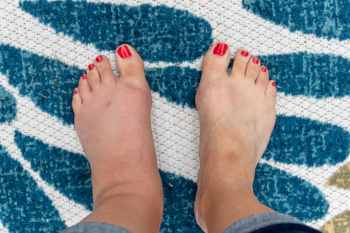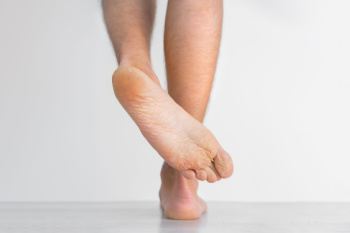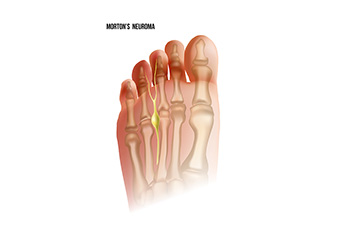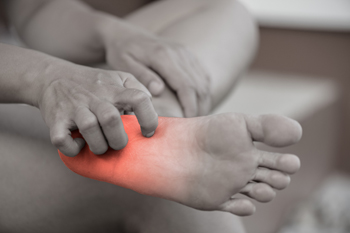May 2024
Uncommon Causes of Swollen Feet

Swollen feet can stem from various unexpected sources beyond the usual suspects like injury or fluid retention. One such cause of swelling, or edema, may be your footwear. Wearing ill-fitting shoes or high heels for prolonged periods of time can impede proper circulation, leading to swelling. A lesser-known cause could be dietary habits, particularly excessive salt intake, which can cause water retention in the body, resulting as swollen feet. Certain medications, such as antidepressants or blood pressure drugs, might also induce swollen feet as a side effect. In some cases, allergies to ingredients in skincare or cosmetic products can trigger inflammation, including in the feet. Additionally, long flights or car rides, where prolonged sitting limits movement, can result in swollen feet due to decreased blood circulation. If your feet have become swollen and remain so, it is suggested that you visit a podiatrist who can help you to manage this condition.
Swollen feet can be a sign of an underlying condition. If you have any concerns, contact Corinne R. Kauderer, DPM of Dyker Heights Foot & Ankle. Our doctor can provide the care you need to keep you pain-free and on your feet.
Swollen feet are a common ailment among pregnant women and people who stand or sit for extended periods. Aging may increase the possibility of swollen feet and patients who are obese often notice when their feet are swelling too. There may be medical reasons why swollen feet occur:
- Phlebitis - A condition that causes the veins to become inflamed and can also cause leg pain.
- Liver disease - This may lead to low blood levels of albumin which is a protein. This can cause fluid in the blood to pass into the tissues and several areas of the body can become swollen.
- Heart failure - When the heart doesn’t pump properly the blood that is normally pumped back to the heart can pool in the veins of the legs causing swollen feet.
- Kidney disease - One of the main functions of the kidneys is releasing excess fluid in the body. This type of condition can make it difficult for the kidneys to function properly, and as a result the feet may become swollen.
- Deep-vein thrombosis (DVT)- This is a serious condition where blood clots form in the veins of the legs. They can block the return of blood from the legs to the heart which may cause the feet to swell. It is important to be treated by a podiatrist if this condition is present.
Swollen feet can also be caused by bone and tendon conditions, including fractures, arthritis, and tendinitis. Additionally, there may be skin and toenail conditions and an infection may cause the feet to swell. Patients who take medicine to treat high blood pressure may be prone to getting swollen feet.
Many patients elevate their feet to help relieve the swelling and this is generally a temporary remedy. When a podiatrist is consulted the reason behind the swelling can be uncovered and subsequently treated.
If you have any questions please feel free to contact one of our offices located in Brooklyn, NY and Old Bridge, NJ . We offer the newest diagnostic tools and technology to treat your foot and ankle needs.
Risk Factors for Athlete’s Foot
 Athlete's foot, a fungal infection that affects the skin on the feet, is especially common among people who frequent damp, warm areas where the fungus thrives. These often include public showers, locker rooms, and swimming pools. The infection spreads easily through direct contact with contaminated surfaces. Wearing tight-fitting, closed-toe shoes can increase the risk, as the warm, moist environment is ideal for fungal growth. People who sweat excessively may be more prone to the infection due to increased moisture levels. Sharing towels, shoes, or socks with someone who has athlete's foot can also transmit the fungus. To reduce the risk of contracting athlete's foot, wearing moisture-wicking socks, using antifungal powders or sprays, and maintaining dry feet are often suggested. Regular foot hygiene and avoiding direct contact with potentially contaminated surfaces are also key preventive measures. If you suspect you have athlete’s foot, it is suggested that you make an appointment with a podiatrist for a diagnosis and care.
Athlete's foot, a fungal infection that affects the skin on the feet, is especially common among people who frequent damp, warm areas where the fungus thrives. These often include public showers, locker rooms, and swimming pools. The infection spreads easily through direct contact with contaminated surfaces. Wearing tight-fitting, closed-toe shoes can increase the risk, as the warm, moist environment is ideal for fungal growth. People who sweat excessively may be more prone to the infection due to increased moisture levels. Sharing towels, shoes, or socks with someone who has athlete's foot can also transmit the fungus. To reduce the risk of contracting athlete's foot, wearing moisture-wicking socks, using antifungal powders or sprays, and maintaining dry feet are often suggested. Regular foot hygiene and avoiding direct contact with potentially contaminated surfaces are also key preventive measures. If you suspect you have athlete’s foot, it is suggested that you make an appointment with a podiatrist for a diagnosis and care.
Athlete’s Foot
Athlete’s foot is often an uncomfortable condition to experience. Thankfully, podiatrists specialize in treating athlete’s foot and offer the best treatment options. If you have any questions about athlete’s foot, consult with Corinne R. Kauderer, DPM from Dyker Heights Foot & Ankle. Our doctor will assess your condition and provide you with quality treatment.
What Is Athlete’s Foot?
Tinea pedis, more commonly known as athlete’s foot, is a non-serious and common fungal infection of the foot. Athlete’s foot is contagious and can be contracted by touching someone who has it or infected surfaces. The most common places contaminated by it are public showers, locker rooms, and swimming pools. Once contracted, it grows on feet that are left inside moist, dark, and warm shoes and socks.
Prevention
The most effective ways to prevent athlete’s foot include:
- Thoroughly washing and drying feet
- Avoid going barefoot in locker rooms and public showers
- Using shower shoes in public showers
- Wearing socks that allow the feet to breathe
- Changing socks and shoes frequently if you sweat a lot
Symptoms
Athlete’s foot initially occurs as a rash between the toes. However, if left undiagnosed, it can spread to the sides and bottom of the feet, toenails, and if touched by hand, the hands themselves. Symptoms include:
- Redness
- Burning
- Itching
- Scaly and peeling skin
Diagnosis and Treatment
Diagnosis is quick and easy. Skin samples will be taken and either viewed under a microscope or sent to a lab for testing. Sometimes, a podiatrist can diagnose it based on simply looking at it. Once confirmed, treatment options include oral and topical antifungal medications.
If you have any questions, please feel free to contact one of our offices located in Brooklyn, NY and Old Bridge, NJ . We offer the newest diagnostic and treatment technologies for all your foot care needs.
Facts About Morton's Neuroma

Morton's neuroma, a condition often misunderstood, affects the foot's nerves, particularly between the third and fourth toes. This ailment, named after Thomas George Morton, a 19th-century American surgeon, causes discomfort and pain. The pain is often likened to walking on a pebble or having a fold in the sock. The sensation arises due to the thickening of the tissue surrounding the nerves, leading to irritation and inflammation. Although high-heeled shoes and tight footwear worsen symptoms, anyone can develop Morton's Neuroma. Interestingly, it is not a true neuroma, but rather a perineural fibrosis, which is a thickening of nerve tissue. Diagnosis typically involves clinical evaluation and imaging studies, with treatment options ranging from orthotics and shoe modifications to more invasive procedures like injections or surgery in more severe cases. If you have pain in this part of your foot, it is suggested that you consult a podiatrist who can diagnose and offer correct treatment solutions for Morton’s neuroma.
Morton’s neuroma is a very uncomfortable condition to live with. If you think you have Morton’s neuroma, contact Corinne R. Kauderer, DPM of Dyker Heights Foot & Ankle. Our doctor will attend to all of your foot care needs and answer any of your related questions.
Morton’s Neuroma
Morton's neuroma is a painful foot condition that commonly affects the areas between the second and third or third and fourth toe, although other areas of the foot are also susceptible. Morton’s neuroma is caused by an inflamed nerve in the foot that is being squeezed and aggravated by surrounding bones.
What Increases the Chances of Having Morton’s Neuroma?
- Ill-fitting high heels or shoes that add pressure to the toe or foot
- Jogging, running or any sport that involves constant impact to the foot
- Flat feet, bunions, and any other foot deformities
Morton’s neuroma is a very treatable condition. Orthotics and shoe inserts can often be used to alleviate the pain on the forefront of the feet. In more severe cases, corticosteroids can also be prescribed. In order to figure out the best treatment for your neuroma, it’s recommended to seek the care of a podiatrist who can diagnose your condition and provide different treatment options.
If you have any questions, please feel free to contact one of our offices located in Brooklyn, NY and Old Bridge, NJ . We offer the newest diagnostic and treatment technologies for all your foot care needs.
Peripheral Neuropathy and Its Impact on the Feet

Peripheral neuropathy is a condition characterized by damage to the nerves outside the brain and spinal cord. It often results in such symptoms as numbness, tingling, and weakness in the extremities. When it affects the feet, peripheral neuropathy can negatively impact mobility and quality of life. The nerves responsible for sensation and motor function in the feet may become impaired, leading to loss of sensation, burning pain, or hypersensitivity. These symptoms can make it challenging to walk or perform daily activities. Additionally, peripheral neuropathy can cause complications, such as foot ulcers and infections, particularly in individuals with diabetes. Regular foot care and monitoring are essential for preventing serious complications. Managing underlying conditions and adopting lifestyle changes, such as maintaining optimal blood sugar levels and wearing supportive footwear, can help alleviate symptoms and improve overall foot health for individuals with peripheral neuropathy. If you have this condition and your feet are affected, it is suggested that you are under the care of a podiatrist who can help you manage peripheral neuropathy.
Neuropathy
Neuropathy can be a potentially serious condition, especially if it is left undiagnosed. If you have any concerns that you may be experiencing nerve loss in your feet, consult with Corinne R. Kauderer, DPM from Dyker Heights Foot & Ankle. Our doctor will assess your condition and provide you with quality foot and ankle treatment for neuropathy.
What Is Neuropathy?
Neuropathy is a condition that leads to damage to the nerves in the body. Peripheral neuropathy, or neuropathy that affects your peripheral nervous system, usually occurs in the feet. Neuropathy can be triggered by a number of different causes. Such causes include diabetes, infections, cancers, disorders, and toxic substances.
Symptoms of Neuropathy Include:
- Numbness
- Sensation loss
- Prickling and tingling sensations
- Throbbing, freezing, burning pains
- Muscle weakness
Those with diabetes are at serious risk due to being unable to feel an ulcer on their feet. Diabetics usually also suffer from poor blood circulation. This can lead to the wound not healing, infections occurring, and the limb may have to be amputated.
Treatment
To treat neuropathy in the foot, podiatrists will first diagnose the cause of the neuropathy. Figuring out the underlying cause of the neuropathy will allow the podiatrist to prescribe the best treatment, whether it be caused by diabetes, toxic substance exposure, infection, etc. If the nerve has not died, then it’s possible that sensation may be able to return to the foot.
Pain medication may be issued for pain. Electrical nerve stimulation can be used to stimulate nerves. If the neuropathy is caused from pressure on the nerves, then surgery may be necessary.
If you have any questions, please feel free to contact one of our offices located in Brooklyn, NY and Old Bridge, NJ . We offer the newest diagnostic and treatment technologies for all your foot care needs.








